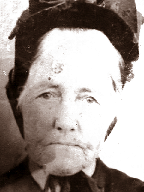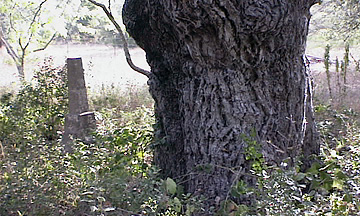|
Brigitte Rosalie Hart/Priour Bridget Rosalie Hart was born August 1st, 1825 in Ballymoney, Ireland (Wexford County). Her parents were Tom Hart and Elizabeth Leary. 
Much is written about Rosalie Hart/Priour and her mother Elizabeth Leary/Hart. Rosalie penned her own autobiography before she died entitled "The Adventures of a Family of Emigrants who Emigrated to Texas in 1834." The book is available for viewing in-library-only at the Corpus Christi Public Library downtown branch. Or, you can read a partial transcription of the manuscript here.
Rosalie married Jean Louis Marie Priour(born Rennes, France, March 25th, 1812) on October 24th, 1844 in Mobile Alabama. Their children were:
Elizabeth Ann Priour - born July 25, 1845 Mobile Alabama.
Julian Marie Priour - born December 18, 1846 Mobile Alabama
(infant) Priour - died at birth, 1847
John Marion Priour - born March 3, 1848, Corpus Christi, Texas. John gained notoriety as an amature ornithologist and was known as the "bird-man" of Corpus Christi. A book was written about his adventures on the Texas coast entitled "A Man from Corpus Christi."
(infant) Priour - died at birth, 1851
Frances Priour - born December 22, 1852 , Corpus Christi, Texas.
Ambrose B. Priour - born December 21, 1853 , Corpus Christi, Texas.
Theodore Priour - born August 15, 1854 , Corpus Christi, Texas.
Peter Isdore Priour - born March 15, 1858 , Corpus Christi, Texas.
Rose Priour - born October 31, 1865 , Corpus Christi, Texas.
The 1860 Nueces County Census* listed 7 children living with "James" and "Rosela Prior." They were Elizabeth (age 15), Julian (age 14), John (age 11), Francis (age 9), Ambrose (age 7), Theodore (age 5), and Isadore (age 2). That's seven children living under one roof. I'm sure Rosalie had quite a time keeping up with them all.
* Corpus Christi REEL NO: 1302 PAGE NO: 295-B. REFERENCE: 7th June 1860, Wm. Js. Davis, p. 30.
Rosalie was also a subject of many of the writings of Corpus Christi historian Frank Wagner. Here he describes her life in "The New Handbook of Texas." He credits Sally Garwood Robeau's book "Of Pride and Pioneers" as a source of his research.
Rosalie Brigitte Hart/Priour
Frank Wagner, The New Handbook of Texas, Volume 5, 1996(1825-1903). Rosalie Priour, pioneer, merchant, and autobiographer, was born on August 1, 1825 ;in Ballymoney, Wexford County, Ireland, the youngest of the ten children of Tom an Elizabeth (O'Leary) Hart. she was christened Bridget and given the name Rosalie, by which she was subsequently known, at her confirmation. She sailed to Texas in 1834 with her parents, who were settlers in the Power and Hewetson colony.(qv) Her father died of cholera the day the family landed at Copano, and the widow and her two surviving daughters lived at Refugio until the Texas Revolution.qv The family fled before the Mexican armies and obtained passage on the American steamship Tensaw, bound for New Orleans. A Mexican cruiser tried to intercept the Tensaw, but the steamship sped away and put in at Mobile and Tuscaloosa. The family lived for the next several years in Mobile and Tuscaloosa. Rosalie Hart was married on October 29, 1844, to Jean Marie Priour, a French gardener who later became a United States citizen, at Mobile. She and her husband joined the widow Hart in Corpus Christi after the Mexican War.(qv) There Mrs. Priour and her mother operated a commission mercantile trade in the 1850s. Their correspondence with lawyers and agents in New Orleans and Mobile, much of it in French, provides a great deal of information about business condition in Corpus Christi. During the Civil War(qv) Rosalie Priour was the only teach at Corpus Christi Academy.(qv) Her husband remained neutral during the war, and his skill as a huntsman and gardener enabled the family to survive. The Priours had ten children, two of whom died in infancy. Late in life Mrs. Priour wrote three drafts of an autobiography that narrated her life up to the end of the Civil War. She died on August 24, 1903, in Corpus Christi.
Bibliography: Sally Garwood Robeau, Of Pride and Pioneers: A Story of the Priour Family (n.d).

Rosalie's contribution to the Civil War effort is described in "Gift of the Wind" by Bill & Marjorie Walraven.
Writer and historian Bill Walraven has also written extensively about Rosalie and family. She is a common subject of both his newspaper articles and his books describing the history of Corpus Christi.
Irish settlers found much hardship in Texas.
Bill Walraven, Corpus Christi Caller-TimesThe history of the Irish is sad, melancholy and often bloody and tragic. Of necessity, they had to laugh, sing and dance and play to keep from crying. Certainly the Irish colonists who settled South Texas before the Texas Revolution found little respite from their travails in their homeland. At home they only had starvation and hostile Englishmen to worry about. In the Texas Irish colonies, those who had survived storms at sea and shipwrecks on the coast found hostile indians and plagues of cholera and dysentery. They also found themselves caught between the Mexican army and Texans in revolt. Some chose Mexico, a Catholic nation as was their own. But most sided with Texans demanding freedoms under a liberal constitution. Many of them were to die in that cause.The saga of the Irish during this period is preserved in a manuscript autobiography by Rosalie Hart Priour, entitled, "The Adventures of a Family of Emigrants Who Emigrated to Texas in 1834." Her grandfather was an Englishman who was disinherited by his family for embracing Catholicism. He was the first man put to death by the English in the revolt of 1798 in Dublin. Her father, who had been a customs officer, was failing as a farmer when Col. James Powers came to Ireland in 1833 to recruit settlers for his colony in Mexican Texas. "He represented Texas as one of the richest countries in the world, and a most delightful climate," Priour wrote. "Gold was so plentiful, according to his account, you could pick it up under the trees." The Hart family and their neighbors sold their property and sailed with farming implements and provisions for a year.
The ship survived a storm and arrived at New Orleans during a severe cholera epidemic. Two schooners taking the emigrants to Texas wrecked on St. Joseph's Island. Cholera broke out on the wreck and"the passengers died so fast that they could hardly throw them overboard as fast as they died." Her father nursed the sick. He made it to land an he, too, became ill and died. The survivors walked to the primitive settlement at Refugio, where many more died of dysentery.
The widow and her two daughters moved in with a family on Papalote Creek and were successful in raising a good crop. But Indians attacked and the crops were left in the fields unharvested. Her mother married John James, who enlisted in the Texas forces and helped capture La Bahia. Wagons came to move women and children from Refugio before the Mexican army arrived in March 1836. They made it to Victoria. James carried a message to Goliad only to find that Col. James Fannin's men had been captured. The Mexicans offered to spare his life since he had not been in the battle. However, he insisted on sharing Fannin's fate. He was shot with the rest of the prisoners. After much hardship in cold and rain, the family made it to Matagorda, where they were picked up by a schooner and taken to Galveston. They traveled on to New Orleans.
Her mother returned to Texas in 1839. Rosalie remained in New Orleans where she was educated and married. Her mother opened a store in Corpus Christi in 1848. Rosalie and her husband moved here in 1853, when there were only 25 Anglo families here. The family was to undergo other misfortunes. Her mother survived a steamship sinking in Galveston, but lost $6,000 in gold. They were swindled out of $4,000 by a crooked New Orleans merchant, and they underwent many other hardships during the Civil War when the city was blockaded and crops failed. There were deaths from yellow fever and a long drought.
It was not an easy life the Irish cut out for themselves. They can be proud of their own pilgrims in South Texas in the settlement of the New World.
--------"The Adventures of a Family of Emigrants who Emigrated to Texas in 1834" can be viewed (in-library-only) at the Corpus Christi Public Library downtown branch.
Rosalie was the only teacher at the Corpus Christi Academy during the Civil War. Read more about the Corpus Christi Academy at the Handbook of Texas Online.
Rosalie died August 24th, 1903 and is buried on the family ranch on the Aransas River.
When Grandma died though, when Papa's mama [Rosalie Priour] died, she wanted to be buried in her mother's grave. And so they all, they went down into her grave and there was nothing left but some hair and one button, I got the button. And then Grandma was buried down in that grave. I've still got that button. -- Annabelle Priour.

More about the Hart Cemetery Rosalie Priour was buried in the same grave as her mother Elizabeth Hart. The cemetery is located near Moss Gully on the Aransas River.
Rosalie B. Priour, Born Aug 1825, died Aug 21, 1903, Born in Tallamony Waxford County (Ballymoney, Wexford County, Ireland)
Friday, June 12, 1903 Beeville Bee -- Obituaries Died in Corpus Christi Monday, August 24, 1903, Mrs. Rosa Lee Priour, aged 78 years, deceased was for many years a resident of Bee County, having resided near Papalote. She leaves several children and quite a number of grandchildren, among who is Theodore Craven of this city. Her remains were shipped to Papalote Tuesday morning and from there taken to the old home site on the bank of the Aransas and laid to rest beside the other members of the family who had preceded her in death.